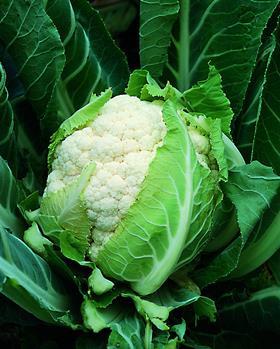
It’s been a long time since the UK has enjoyed such a consistently hot, dry summer, and brassicas – like so many beetroot-red Brits – are struggling to handle the heat.
Brassica shortages and high prices are now inevitable, according to suppliers, and right now growers are focused on simply keeping crops alive, rather than encouraging them to grow as they normally would.
Rain and cold weather in the spring delayed the start of the season by around three weeks, with growers prevented from getting out in the fields to sow. Now growers have the opposite problem: a lack of water, coupled with high temperatures, is forcing them to continually irrigate crops just to keep them alive.
“Brassica supply is very difficult at the moment,” says George Beach, managing director of Mudwalls Farm in Warwickshire. “The plants are basically saying: ‘Unless you give me a bit of cold and a bit of water, I’m not going to grow any more – I’m just going to sit here and wait. Hopefully I won’t die if it doesn’t get too hot, but I’m probably not going to grow until it cools down and gets a bit damp.”
Beach says Mudwalls is “skimming off little bits of harvest” at the moment but broccoli and kale still isn’t quite ready. “The plants are probably only about two thirds what they should be by now,” he reports. “We’d expect them to be big, bold and ready by now, but they’re still a bit stunted.”
In the coming weeks, Beach says the UK is going to see limited supplies, erratic availability and higher prices across all the brassicas. “It’s still a little bit early to be talking about yields,” he says, “but I think volumes could halve.”
The difficulty for growers is that, although supply shortages will push up prices, a lot of cost is being added to the production process. “It isn’t just about catching a small market,” says Beach, “there’s also a lot more cost going into producing brassicas at the moment because of the irrigation that’s needed. Yields will be down so the value of the product has to go up.”
Looking abroad
As a predominantly UK-focused supplier, Mudwalls ruled out sourcing product from outside the UK to plug any gap in supply. “Mudwalls Farm is very much about British produce and seasonality,” Beach says. “If we haven’t quite got enough, then we offer different products as a replacement.”
By contrast, Kent-based supplier Veg UK was importing cauliflower from Poland and Germany two weeks ago in order to maintain steady supply. “The cold and extreme wet weather we had back in January and February meant we were unable to plant anything, so there’s been a big gap between the winter crop and the summer crop,” says business development manager Shane Talling. “We therefore had to look to Poland and Germany to help plug that gap.”
Fortunately, Talling notes that as well as driving down yields, the hot weather is suppressing demand for vegetables. “Supermarket orders have currently dropped, which we expected due to the combination of the World Cup and the warm weather,” he says. “With the weather being like it is, there has been a lot more around on the markets to try to sell, however when the weather reaches 25°C+ the growth of crop begins to slow.”
While recent conditions have raised concerns of a potential shortage, the arrival of rain could also prove challenging for growers since a combination of heat and rain would bring a glut of produce, causing supply to outstrip demand. “We are in a catch-22,” says Talling. “If we had the rain now, the outcome would be crops coming on in abundance, where the demand is simply not there. In the same breath, new planting where the ground is so dry may cause further problems down the line.”
Weather aside, another important challenge for growers this season will be controlling Diamondback Moth, which remains problematic for brassica growers following a major outbreak two years ago. Fortunately, there is now a crop protection product on the market called Verimark, which Talling says looks promising. “There’s been a small indication of issues with Diamondback Moth this season,” he adds, “but nothing to send alarm bells ringing as of yet.”
From a sales perspective, the past year has been largely positive for the category, with mainstay brassicas broccoli, cauliflower and Brussels sprouts all enjoying rises. In the 52 weeks to 20 May the three products saw their value sales rise by 10.5 per cent, 1.6 per cent and 4.2 per cent respectively, according to Kantar.
Kale has had a more challenging year, and sales have now dipped after five years of rapid growth. Revenues dropped by 7.5 per cent in the year to 20 May, but David Rogers of Tozer Seeds says this was inevitable following the superfood’s “meteoric rise” in recent years. “The bigger picture is that kale has now become a mainstream item in the UK shopping basket,” he says. “Why has it decreased? I think it’s more that sales have stabilised. Hopefully the market will remain stable in the coming years.”
Beach, for his part, puts the dip down to widening customer choice. “Chefs have really been getting behind kales and using them in various different formats,” he says, mentioning health drinks, “fashionable salads” containing bulgar wheat and rice, and “fancy” stir fries. Now, however, there are a lot of other superfoods and healthy options available.






No comments yet